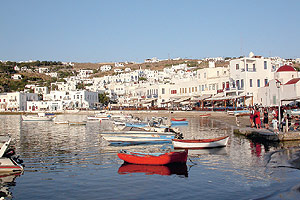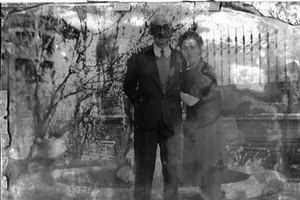During the First Millennium B.C. the first and most advanced civilization of the western world formed in Greece and the islands of the Aegean Sea.
Currently, Greece, officially denominated «Hellenic Republic«, is a state located to the south of The Balkans. It occupies an area of 132 thousand km2 and has more than 10,5 million inhabitants. It has borders in the north with Bulgaria and Macedonia, the east with Turkey and the Aegean Sea, the south with the Mediterranean Sea and the west with the Ionian Sea and the northwest with Albania.
The capital of the country is Athens and the main cities are Thesaloniki, Pireaus and Patras. Greek is the official language and the main religion is Orthodox Christian (98%). As a member of the European Union, the currency used is the Euro. One third of the population is concentrated in Athens and its port, the Piraeus. Greece is administratively divided into 13 regions, each subdivided into prefectures. There is also one autonomous region under Greek sovereignty, Mount Athos, located in the northernmost peninsula in central Macedonia. Athos houses 20 Orthodox monasteries.
Geographical Differences
Owing to its geographical diversity, the country is divided into three regions from north to south:
– Continental Greece: A very mountainous region, it is the largest in the country. Mount Olympus, the highest in Greece (2,917 m) and the House of the Gods according to mythology, is located in this region. Thessaly stands out among the few valleys located in this area.
– Peninsular Greece: It comprises the Peloponnese Peninsula, attached to the continent by the Isthmus of Corinth.
– Insular Greece: It encompasses Crete and the Greek Islands located in the Aegean and Ionian Seas. It accounts for around 20% of the country’s territory.
The country’s climate is Mediterranean, with the exception of the northern area, which has cold winters and heavy rainfall. Perennial leafed trees are common in the lowlands of this area -where 80% of the land is mountainous- and the coastal plains are filled with bushes and white pines. Forests cover around 20% of all Greek territory.
Economy
Despite the scarcity of arable lands, the role of agriculture is fundamental. Around 20% of the population still works in rural areas. The main crops are cereals, citrus fruits, vines, tobacco, fruits and olives. Greece is the third producer of olive oil worldwide. Ovine livestock prevails in the mountains.
Other important sources of income are tourism and the shipping industry.
Most of the industries are concentrated in Athens, Piraeus and Thesaloniki, and basically process in raw materials.
Brief History
After its classic period, Greece was constantly invaded or intervened until the 20th Century: starting from the middle of the 4th century B.C., Phillip II of Macedon, and later his son, Alexander the Great carried out the conquest of the country; in mid 2nd century A.D., Greece came to be a Roman territory; in the year 395 A.D. it was incorporated into the Eastern Roman Empire or Byzantine Empire; during the 4th and 5th centuries, it suffered the successive invasions of Visigoths, Ostrogoths, Huns, Slavs and Avars and later, the Arabs, Bulgars and Normans; in 1204, the Fourth Crusade created the Latin Empire of Constantinople, the Kingdom of Thessaly, the Principality of Acaya or Morea and several duchies.
During the 14th and 15th centuries, Venetians, Genoese and Catalans fought over the possession of Greece, while the Ottomans occupied Thrace, Thessaly and Macedonia in the mid 14th Century.
In 1456, the Ottomans conquered Athens and the Peloponnese Peninsula.
Greece was part of the Ottoman Empire for almost four centuries, until March 25, 1821, when a revolutionary movement broke out. In 1822, the Congress of Epidauros proclaimed independence. The Turks were finally defeated in 1827, when Great Britain, France and Russia intervened. The protector powers imposed a Monarchy that stretched well into the 20th Century.
In 1924, the Republic was proclaimed, but anarchy followed. During World War II, Greece was invaded by Germany and Italy.
A civil war ensued from 1946 to 1949. Different governments succeeded each other until 1973, when Monarchy was abolished and the Republic was proclaimed once again.
In 1975, the current constitution was enacted. It established a Parliamentary Republic and divided Executive power among a President, a Head of State and the Commander in Chief of the Armed forces, and a Prime Minister who is the leader of the Government.








